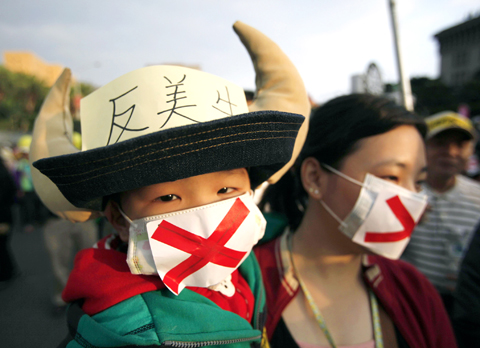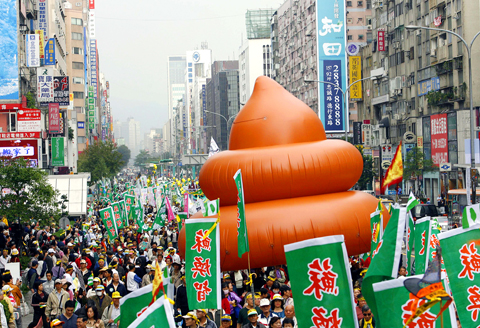Wearing headbands with the words “no to poisonous beef” and “no to deception,” thousands of people took to the streets of Taipei yesterday afternoon to voice their opposition to the government’s decision to lift a ban on US bone-in beef and beef organs, and urge the government to renegotiate the agreement.
Demonstrators from all over the country started to gather at the assembly point near Zhongxiao Fuxing MRT station hours before the official start of the march.
The demonstration was organized by the Tainan County Government and several civic groups, including the Taiwan Labour Front, the Taiwan Association of University Professors and the Foundation of Medical Professionals Alliance in Taiwan, in reaction to the lifting of the ban on imports of bone-in beef, beef organs and ground beef from the US.

PHOTO: NICKY LOH, REUTERS
After the government had been negotiating with the US on the issue for about two years, the Department of Health announced on Oct. 23 that it had signed a protocol with the US that would allow bone-in beef, ground beef, bovine intestines, brains, spinal cords and processed beef from cattle younger than 30 months that have not been contaminated with “specific risk materials” (SRM) to be imported.
“Whether to lift the ban [on certain US beef parts] is a public health issue that should have been fully debated by the public before a decision was made,” Democratic Progressive Party (DPP) Chairperson Tsai Ing-wen (蔡英文) told the crowd before the march began at 2:30pm.
“The government never talked about it with the legislature, the opposition or the public — we only knew about it after the government had signed an agreement with the US. That violates the principles of democracy and transparency,” she said.

PHOTO: NICKY LOH, REUTERS
Tsai cited a resolution passed by the legislature in January 2006 stating that the government should consult with and gain approval from the legislature before lifting the ban on US beef parts.
“We are demonstrating to ask for one thing — that the beef deal be renegotiated,” Tsai said.
“If they [the government] cannot do it, they should step down and let us do it,” she said.
Since the announcement on Oct. 23, the government has faced an uphill battle persuading a skeptical public on the safety of US beef, with leading consumer groups and opposition politicians pushing for a referendum on reimposing the beef-on-the-bone import ban.
National Security Council Secretary-General Su Chi (蘇起) earlier this month apologized for poor communication before the lifting of the ban and the Executive Yuan pledged that it would tighten inspections and effectively block ground beef and bovine intestines by changing import inspection rules. Ground beef and intestine imports will have to be thawed for examination (ruining them in the process) and any shipments mixed with bone-in beef would be destroyed, the government said.
The unconvinced demonstrators shouted slogans and called for renegotiation, while march organizers explained through loudspeakers to the crowd and passers-by that they were against lifting the ban because bone-in beef and beef organs were more likely to carry prion, the infectious agent of mad cow disease that is composed mostly of protein.
“If you think you’ll be safe because you don’t eat beef, you’re wrong — when prion enters the food chain, it may also contaminate pork and even the soil,” a demonstrator said. “So you may be infected with mad cow disease even if you’re a vegetarian.”
The 32-year-old user of online social networking service Plurk.com, Lin Jung-cheng (林融政), was among a group of about a dozen plurkers from Taipei, Taichung and Tainan taking part in the march.
“Of course we’re worried about the safety of US beef, but we’re more upset that the government signed the agreement [to lift the ban] without telling the public first,” Lin said. “We’re quite suspicious about what the government has gained from the US in return.”
A woman surnamed Lai (賴) in her 50s took her 10-year-old grandson, dressed in a cow costume, with her to the march.
She said she didn’t care if she was infected with mad cow disease since she’s lived a full life, “but I must take part in the protest for the sake of my grandchildren and their grandchildren.”
Tang Kao Hsuan-feng (唐高炫風) drew a lot of attention for wearing his camouflage army uniform and holding a large Republic of China flag.
“I voted for [President] Ma Ying-jeou [馬英九] and was a big supporter, but that doesn’t mean that I should pretend that I don’t see when he makes mistakes, because I know what’s wrong and what’s right,” Tang Kao said. “Ma should renegotiate the beef agreement because US beef threatens the health of Taiwanese.”
Former DPP legislator Hsu Kuo-yung (徐國勇), on the other hand, urged the public to call on elected representatives to support a proposed amendment to the Act Governing Food Sanitation (食品衛生管理法) scheduled for review in the legislature on Thursday that would block imports of some US beef parts.

AIR SUPPORT: The Ministry of National Defense thanked the US for the delivery, adding that it was an indicator of the White House’s commitment to the Taiwan Relations Act Deputy Minister of National Defense Po Horng-huei (柏鴻輝) and Representative to the US Alexander Yui on Friday attended a delivery ceremony for the first of Taiwan’s long-awaited 66 F-16C/D Block 70 jets at a Lockheed Martin Corp factory in Greenville, South Carolina. “We are so proud to be the global home of the F-16 and to support Taiwan’s air defense capabilities,” US Representative William Timmons wrote on X, alongside a photograph of Taiwanese and US officials at the event. The F-16C/D Block 70 jets Taiwan ordered have the same capabilities as aircraft that had been upgraded to F-16Vs. The batch of Lockheed Martin

GRIDLOCK: The National Fire Agency’s Special Search and Rescue team is on standby to travel to the countries to help out with the rescue effort A powerful earthquake rocked Myanmar and neighboring Thailand yesterday, killing at least three people in Bangkok and burying dozens when a high-rise building under construction collapsed. Footage shared on social media from Myanmar’s second-largest city showed widespread destruction, raising fears that many were trapped under the rubble or killed. The magnitude 7.7 earthquake, with an epicenter near Mandalay in Myanmar, struck at midday and was followed by a strong magnitude 6.4 aftershock. The extent of death, injury and destruction — especially in Myanmar, which is embroiled in a civil war and where information is tightly controlled at the best of times —

China's military today said it began joint army, navy and rocket force exercises around Taiwan to "serve as a stern warning and powerful deterrent against Taiwanese independence," calling President William Lai (賴清德) a "parasite." The exercises come after Lai called Beijing a "foreign hostile force" last month. More than 10 Chinese military ships approached close to Taiwan's 24 nautical mile (44.4km) contiguous zone this morning and Taiwan sent its own warships to respond, two senior Taiwanese officials said. Taiwan has not yet detected any live fire by the Chinese military so far, one of the officials said. The drills took place after US Secretary

THUGGISH BEHAVIOR: Encouraging people to report independence supporters is another intimidation tactic that threatens cross-strait peace, the state department said China setting up an online system for reporting “Taiwanese independence” advocates is an “irresponsible and reprehensible” act, a US government spokesperson said on Friday. “China’s call for private individuals to report on alleged ‘persecution or suppression’ by supposed ‘Taiwan independence henchmen and accomplices’ is irresponsible and reprehensible,” an unnamed US Department of State spokesperson told the Central News Agency in an e-mail. The move is part of Beijing’s “intimidation campaign” against Taiwan and its supporters, and is “threatening free speech around the world, destabilizing the Indo-Pacific region, and deliberately eroding the cross-strait status quo,” the spokesperson said. The Chinese Communist Party’s “threats